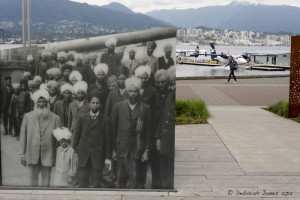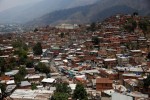
The Story of the Komagatu Maru, by Rod Mickleburgh, report
At long last, a formal apology was delivered in the House of Commons for Canada’s racist behaviour in its shameful treatment of Sikh passengers aboard the Komagata Maru who had the effrontery to seek immigration to the West Coast more than a hundred years ago. Not only were they denied entry, they were subjected to two months of exceptionally inhumane treatment by unflinching immigration officers. While many now know the basics of the ill-fated voyage, the story has many elements that are less well known.

The toddler tied to a rock while parents work, by Amit Dave, report
There are about 40 million construction workers in India, at least one in five of them women, and the majority poor migrants who shift from site to site, building infrastructure for India’s booming cities. Across the country it is not uncommon to see young children rolling in the sand and mud as their parents carry bricks or dig for new roads or luxury houses.
Yemen yearns for peace, by Mohamed al-Sayaghi Photo-essay
Anxiety reigns in the Yemeni capital Sanaa, where ordinary people await the outcome of almost a month of peace talks they hope can end a devastating war.

Commentary
Venezuela’s drawn-out agony nears crisis, by Jonathan Manthorpe, International Affairs column
 This weekend’s largest military exercises ever by Venezuela may reveal whether the country is heading merely for an accelerated political and economic melt-down, or a full-blown civil war.
This weekend’s largest military exercises ever by Venezuela may reveal whether the country is heading merely for an accelerated political and economic melt-down, or a full-blown civil war.
The triumph of fear in America, by Tom Regan, Summoning Orenda column

There isn’t a fear that Americans won’t embrace. Fear controls almost every aspect of America society, seeps into every part of our lives. And that fear is used to manipulate us.
European data suggests the gig economy helped create Trump, Sanders. By Jonathan J.B. Mijs Expert Witness
Politicians and pundits in America wonder where the rip-roaring popularity of protest candidates Donald Trump and Bernie Sanders originated. The answer may lie in Europe. My coauthors and I link the success of Trump’s kind of politics to the worldwide adoption of neoliberal economic policies, government measures that shift control from the state to the market.
In case you missed it –a selection of our most recent stories:
- Cremona — Italy’s City of Violins
STEFANO RELLANDINI Arts/Photo-essay - Dead man’s sperm: post-mortem donation
JENNY MORBER - Venezuela’s struggle to keep the lights on
Reuters Report - Trump and Clinton prove America’s voting system is broken
MICHEL BALINSKI & RIDA LARAKI Expert Witness - Commentary:
- JONATHAN MANTHORPE, International Affairs
Canada’s Navy: Dying From Neglect
North Korea’s Kim rattles the bars of his cage
The Trump virus goes global - TOM REGAN, SUMMONING ORENDA Column
Commercial journalism can’t die fast enough
Trump has made racism and violence “OK” in the US
America’s hate-on for women - Fort McMurray: Boom, bust …burned
ROD NICKEL & LIZ HAMPTON Report - Fort McMurray: from “black pitch” and salt to oil sands
BRIAN BRENNAN History - Sadiq Khan: London’s first Muslim mayor
PARVEEN AKHTAR - The Irreconcilable Narratives of America’s South,
RUTH HOPKINS Justice report
~~~
Facts and Opinions is a boutique journal of reporting and analysis in words and images, without borders. Independent, non-partisan and employee-owned, F&O is funded by our readers. It is ad-free and spam-free, and does not solicit donations from partisan organizations. To continue we require a minimum payment of .27 for one story, or a sustaining donation. Details here; donate below. Thanks for your interest and support.

